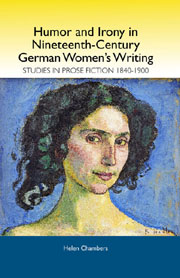Book contents
- Frontmatter
- Contents
- Acknowledgments
- Introduction
- 1 Annette von Droste-Hülshoff and Ida Hahn-Hahn: Overcoming Seriousness?
- 2 Ottilie Wildermuth and Helene Böhlau: Harmless Humor or Subtle Psychology?
- 3 Marie von Ebner-Eschenbach: Satire, Physical Comedy, Irony, and Deeper Meaning
- 4 Ada Christen and Clara Viebig: Laughter and Pain in the World of Work
- 5 Isolde Kurz and Ricarda Huch: The Humor of Skeptical Idealism
- Conclusion
- Works Cited
- Index
2 - Ottilie Wildermuth and Helene Böhlau: Harmless Humor or Subtle Psychology?
Published online by Cambridge University Press: 05 February 2013
- Frontmatter
- Contents
- Acknowledgments
- Introduction
- 1 Annette von Droste-Hülshoff and Ida Hahn-Hahn: Overcoming Seriousness?
- 2 Ottilie Wildermuth and Helene Böhlau: Harmless Humor or Subtle Psychology?
- 3 Marie von Ebner-Eschenbach: Satire, Physical Comedy, Irony, and Deeper Meaning
- 4 Ada Christen and Clara Viebig: Laughter and Pain in the World of Work
- 5 Isolde Kurz and Ricarda Huch: The Humor of Skeptical Idealism
- Conclusion
- Works Cited
- Index
Summary
Und wenn ich das, was zu verdammen Beleuchte mit des Scherzes Flammen Trifft oft nicht besser des Spottes Strahl Als lange Predigt voll Moral?
OTTILIE WILDERMUTH, DAUGHTER AND WIFE of professional middle-class men, won public recognition as a writer with an enthusiastic following from far beyond her native Swabia where she set the stories and Genrebilder, scenes from everyday life, which made her famous. Her admirers included the writers Adalbert Stifter, Jeremias Gotthelf, and Paul Heyse, who asked permission to include one of her stories in his prestigious Novellenschatz series, as well as the older poets Ludwig Uhland and Justinus Kerner, whom she knew personally. In 1871 she was the first woman to receive the Goldene Medaille für Kunst und Wissenschaft from the King of Württemberg. The appeal of her works crosses class and gender boundaries and is due in large measure to their distinctive combination of humor and realism. Many evoke the small-town life of Wildermuth's childhood in Marbach and it is not surprising that this lost world and its narrow compass was a haven of order to post-1848 readers, whether they were disillusioned with the failure of the revolution or relieved at the receding threat of instability, as well as for those living in the troubled times of the 1870/71 Franco-Prussian War. One of her prime aims in writing is to show how to achieve happiness and contentment in unfavorable circumstances, but as Peter Härtling rightly points out in the introduction to a recent selection of her work, there is more to her writing than the cozy reassurance of a Biedermeier world.
- Type
- Chapter
- Information
- Humor and Irony in Nineteenth-Century German Women's WritingStudies in Prose Fiction, 1840–1900, pp. 53 - 90Publisher: Boydell & BrewerPrint publication year: 2007



